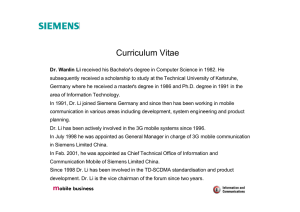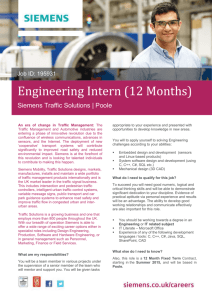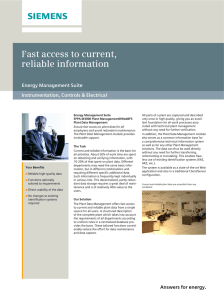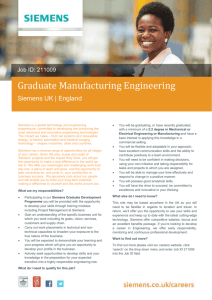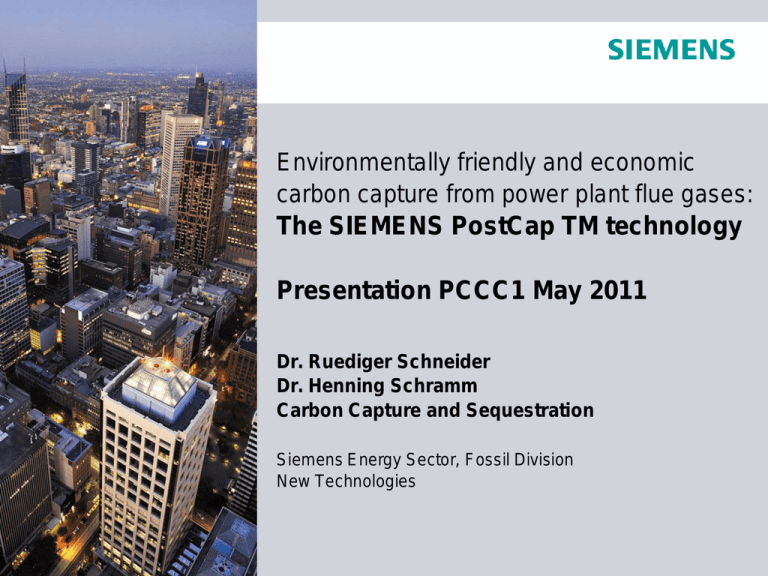
Environmentally friendly and economic
carbon capture from power plant flue gases:
The SIEMENS PostCap TM technology
Presentation PCCC1 May 2011
Dr. Ruediger Schneider
Dr. Henning Schramm
Carbon Capture and Sequestration
Siemens Energy Sector, Fossil Division
New Technologies
Trends in power generation –
Two possible scenarios
Ocean
Biomass, Waste
1%
17%
Geothermal
4%
40%
Solar CSP
6%
Wind
Onshore
+2.8% p.a.
11%
Bright Green Scenario
assumptions:
21%
Solar PV
Wind
Offshore
36.7
13%
World power generation
(in 1000 TWh)
Cost-cuts in renewables
35.7
13–17%
Energy storage available
17%
Renewables
15%
Hydro
14%
Nuclear
22%
Gas
3%
Oil
30%
Coal
15%
CAGR
+9.6 %
21.0
4%
15%
14%
Expansion of transmission
grids
Gas to compensate for
intermittency of renewables
21%
13%
3%
21%
58%
5%
68%
34%
42%
2010
2030
Base Case
34–30%
2030
Bright Green Scenario
Source: Siemens
Page 2
PCCC1 May 11
Copyright © Siemens AG 2010. All rights reserved.
CCS market scenarios
IEA Blue Map
Assumption:
Power Generation:
5.5 Gt CO2 captured in
2050
Example:
Coal:
800MW gross, 40% net
eff., 7,000 h/a ; capture
rate 90%
Result => 4 Mt/a captured
Theoret. Market: ca.
=> 1.400 PS
In all scenarios: CCS in power and industry play an important role
Page 3
PCCC1 May 11
Copyright © Siemens AG 2010. All rights reserved.
Innovation fields along the entire
energy conversion chain
Nuclear Power
Generation
Offshore &
Subsea
Oil&Gas
Page 4
Pipeline
Transportation and
Gas Liquefaction
Highly Efficient
Coal- and gas
fired Power Plants
Wind Power
Generation
Gasification
PCCC1 May 11
Solar Power
Generation
HVDC-Transmission
and HVDC Grids
Smart Grid incl.
Energy Storage,
E-Mobility
Carbon Capture
and Storage
Copyright © Siemens AG 2010. All rights reserved.
Siemens Post-Combustion Carbon Capture
for Fossil Fuel fired Power Plants
CO2 Absorption, Desorption
SIEMENS PostCap Process
is proven technology
in chemical processing and oil& gas
industry
based on: AMINO ACID SALT Formulations
“Scalable” market introduction ,
retrofittable
SPP w/ PostCapTM Process
Preferred solution for CCS
demonstration projects
Task: => Mastering Scale up from
pilot to demoplant.
Page 5
validated in pilot plant
PCCC1 May 11
Copyright © Siemens AG 2010. All rights reserved.
R&D Collaboration with the Netherlands
Organization for Applied Scientific Research (TNO)
Exclusive Agreement Signed
Aimed at further advancement of amino
acid salt based carbon capture technology
Targets faster time to market and
implementation of full-scale demo plant by
2014
Leverage synergies and optimize
resources
June 2009 Agreement Signing
Extensive Development at TNO
Performing research in the field since
1990‘s
Coordinates €90 million CATO-2 national
CCS program
Further Solvent Development Focus
Reduce Power Demand
Reduce Costs
Page 6
PCCC1 May 11
Copyright © Siemens AG 2010. All rights reserved.
Masdar / Abu Dhabi
Fields of co-operation
R&D Cooperation
Masdar Institute
Smart Grid / Smart Building
Masdar City
Carbon Capture & Storage
Long-term strategic
partnership
Masdar Carbon
Agreement signed March 3rd 2011
Page 7
PCCC1 May 11
Copyright © Siemens AG 2010. All rights reserved.
Siemens CO2 Capture Process
Based on Amino Acid Salts
+
K O
-
R’
C
O
C
H
H
N
R
Solvent slip nearly zero,
no additional washing
unit required
Amino acid salt
Salts have no
vapor pressure
• No thermodynamic
solvent emissions
• Not flammable
• Not explosive
• Odorless
• No inhalation risk
• Chemically stable,
low degradation (O2)
• Naturally occurring
Environmental
Friendly
Low Energy
Demand
2.7 GJ / ton CO2
The efficiency is < 6 %-pts. lower than the reference hard-coal fired power plant*,
w/o CO2 compression.
*SSP5-6000 (800 MWel,net,
600°C/610°C/270bar)
Page 8
Copyright
©
Siemens
AG 2010. All rights reserved.
PCCC1 May 11
Environmental Impact
Solvent Consumption and Emissions
No solvent
losses
Capture Process
Solvent degradation
(thermal, O2, NOx,
SOx, etc...)
Refill *
* PostCap
refill for
reference
coal power
station 80%90% lower
than for
Amine
process
Solvent
Waste
Reclaiming
Recycling
Siemens’ development of reclaimer enables minimization of solvent refill
Page 9
PCCC1 May 11
Copyright © Siemens AG 2010. All rights reserved.
Upscaling: Lab to Pilot Plant
Carbon Capture Pilot Plant at E.ON SPP„Staudinger“
Flue gas downstream
of FGD (140 Nm3/h)
Footprint of capture plant for
800 MW SPP, approx.: 25.000 m2
FGD
CO2
Absorber/
Desorber
Upscaling via SlipStream Demo Plants
Status March 2011:
> 4000 operating
hours
Start Operation
September 2009
Page 10
PCCC1 May 11
Copyright © Siemens AG 2010. All rights reserved.
Siemens Amino Acid Salt Technology with lowest
emissions and highly efficient reclaiming system
Amine based Technologies
Siemens PostCap Technology
Additional washing steps on top of the
absorber required, due to evaporating
amines and nitrosamines
Not required in Siemens process, AAS and
nitrosamines are non-volatile
Even with additional washing steps amine
based technologies cause solvent
emissions
Nitrosamines predictable in the known
processes have different sources
No solvent emissions predictable in Siemens
process
formed by means of the direct
nitrosation of the solvent within the capture
process
formed from emitted amines (solvent
degradation products) in the atmosphere.
Page 11
PCCC1 May 11
The PostCap solvent as well as nearly all
degradation products and any formed
nitrosamines / nitramines are non-volatile.
Even without additional washing steps, Siemens
PostCap process has demonstrably no solvent
emissions.
Measured nitrosamine emmisions caused of
PostCap process is zero.
By-products can be separated for disposal
in a 2-step reclaiming system.
Copyright © Siemens AG 2010. All rights reserved.
Pilot Plant Operation Results and Conclusions
After more than 4,000 hours of operation
Efficiency
Low energy consumption
< 6% pts efficiency loss
2.7 GJ heat consumption
High capture rate: >90 % proven
Emissions
Solvent losses through absorber
practicably zero
< 1%/year solvent degradation by O2
High thermal stability
Smart reclaimer concept for SO2
applicable
Corrosion tests proved standard
construction material
1-train concept for 250 MW
Add‘l washing step avoided
Permission less critical
Low refill requirements
Low reclaiming costs
Hardware
Page 12
PCCC1 May 11
Low CO2 capture cost
Solvent
stability
EU prerequisites can be
easily met
Standard construction
material
Reduced investment costs
Copyright © Siemens AG 2010. All rights reserved.
DOE-funded Pilot Plant in the USA
Operation start planned mid 2012
CCS Pilot Plant Information and Timing
Page 13
PCCC1 May 11
Flue gas from a coal-fired power plant
Pilot plant size: approx. 2.5 MWel slip stream
Funding by DoE: 15 million US$
DOE award: September 2010
Project start: October 2010
Operation: mid 2012 - mid 2013
Copyright © Siemens AG 2010. All rights reserved.
Capture Ready Requirements for SPP:
Basis: 800-900 MWel STP, Internat’l Coal
Capture
Plant
CO2compressor
Page 14
PCCC1 May 11
Copyright © Siemens AG 2010. All rights reserved.
CCPP Compared to SPP Flue Gas …
Exemplary Figures
NGCC
SPP
vol-%
CO2
4
14
Lower CO2
content
Lower solvent
loadings and
driving force
Higher specific
energy demand
for regeneration
Slower reaction
kinetics
Higher
columns
Higher solvent
degradation
Higher solvent
consumption
vol-%
O2
3
12.5
Higher O2
content
Kg/s per MWel,gross
Specific
Fluegas
Flow
1.0
1.6
More
flue gas
Larger absorber
diameter
Solvent and process optimization is required to take special NGCC flue gas
properties into account
Page 15
PCCC1 May 11
Copyright © Siemens AG 2010. All rights reserved.
3D – Illustration of a CCPP
with 100% Flue Gas Capture Plant ( 420 MWel)
Page 16
PCCC1 May 11
Copyright © Siemens AG 2010. All rights reserved.
Plant Performance w/ Carbon Capture
Comparison for Different Fuels
Combined Cycle Power Plant
Steam Power Plant
1
2
∆ηnet
Capture Process
∆ηnet
-8.5 %-pts.
Optimized1
-6.9 %-pts.
-6.0 %-pts.
Optimized w/o Compression2
-5.6 %-pts.
“Optimized“ means capture process configuration and operating conditions are adapted to the specific flue gas conditions of the underlying power plant
“w/o Compression“ – the numbers consider the power demand of the capture process, but not of the usually required subsequent compression of the CO2
for transport
Page 17
PCCC1 May 11
Copyright © Siemens AG 2010. All rights reserved.
Requirements for “best in class” carbon capture
technology, e.g. Post Combustion.
“Zero emission” solvent, no additional
washing steps required
State of the art reclaiming system with very
limited solvent losses
Limited solvent degradation
(O2, SOx, NOx, thermal)
Energy consumption for regeneration
< 2,7 GJ/tCO2
Optimal integration in power plant
… < 6% efficiency drop
… < 30min response time to full
capacity in gas-fired CCPP
Page 18
PCCC1 May 11
Copyright © Siemens AG 2010. All rights reserved.
Siemens Power Plant and CCS Solutions
Partner from process development to EPC supply
Strengths
Experience
Power
Generation
Environmentally friendly solvent
Integration into Power Plant
Chemical
Processing
And System Optimizations
Oil & Gas
Industry
Minimizing solvent losses and
is state-of-the-art power plant and CCS technology
provider
Emissions
Project execution from a single point of responsibility
Efficient “Green Power Plant”
Carbon Capture Process
Development
Process- and
ModellDevelopment
Page 19
Piloting
and
Optimizati
on
Engineering & Construction of
Post-combustion Carbon Capture Demo Plant
FEED /
Basic
eng.
Licensing
PCCC1 May 11
Detail Constructio Comiseng.
n
sioning
&
Installatio
n
Plant
support
Copyright © Siemens AG 2010. All rights reserved.
Summary
Fossil fuels will maintain a big share in global electricity production and carbon
capture is one important and necessary measure to cope with climate change
Siemens offers an unique portfolio of high efficient power plants as well as pre- and
post-combustion carbon capture solutions to reduce and/or avoid CO2 release
Post-combustion technology comprises a proprietary chemical absorption process
which is retrofitable to coal and gas fired power stations
The so called PostCap process exhibits an outstanding environmentally friendly
character and is very energy efficient.
The advantages of the PostCap process were successfully verified in the
Staudinger pilot plant. It is ready to be applied in demonstration scale projects.
PostCap Process fits well in the GCC Environment
Page 20
PCCC1 May 11
Copyright © Siemens AG 2010. All rights reserved.
“Many thanks for your kind
attention”
Page 21
PCCC1 May 11
Copyright © Siemens AG 2010. All rights reserved.
Dr. Rüdiger Schneider
Siemens AG - Energy Sector
Fossil Power Generation Division
E F NT CCS
Tel.: +49 (69) 797-84739
Fax: +49 (69) 797-84991
Mobil: +49 (173) 218 31 91
mailto: Ruediger.Schneider@siemens.com
Page 22
PCCC1 May 11
© Siemens AG 2011
Energy Sector
Copyright © Siemens AG 2010. All rights reserved.
Disclaimer
This document contains forward-looking statements and information – that is, statements related to future, not past,
events. These statements may be identified either orally or in writing by words as “expects”, “anticipates”, “intends”,
“plans”, “believes”, “seeks”, “estimates”, “will” or words of similar meaning. Such statements are based on our current
expectations and certain assumptions, and are, therefore, subject to certain risks and uncertainties. A variety of
factors, many of which are beyond Siemens’ control, affect its operations, performance, business strategy and results
and could cause the actual results, performance or achievements of Siemens worldwide to be materially different from
any future results, performance or achievements that may be expressed or implied by such forward-looking
statements. For us, particular uncertainties arise, among others, from changes in general economic and business
conditions, changes in currency exchange rates and interest rates, introduction of competing products or technologies
by other companies, lack of acceptance of new products or services by customers targeted by Siemens worldwide,
changes in business strategy and various other factors. More detailed information about certain of these factors is
contained in Siemens’ filings with the SEC, which are available on the Siemens website, www.siemens.com and on the
SEC’s website, www.sec.gov. Should one or more of these risks or uncertainties materialize, or should underlying
assumptions prove incorrect, actual results may vary materially from those described in the relevant forward-looking
statement as anticipated, believed, estimated, expected, intended, planned or projected. Siemens does not intend or
assume any obligation to update or revise these forward-looking statements in light of developments which differ from
those anticipated.
Trademarks mentioned in this document are the property of Siemens AG, it's affiliates or their respective owners.
Page 23
PCCC1 May 11
Copyright © Siemens AG 2010. All rights reserved.

